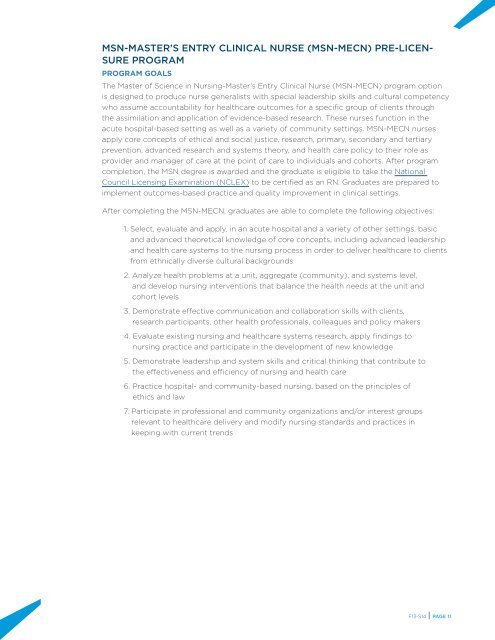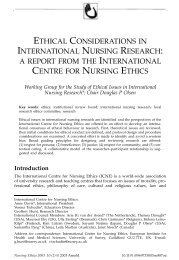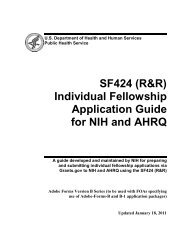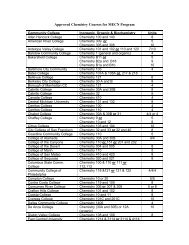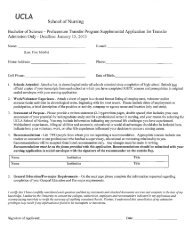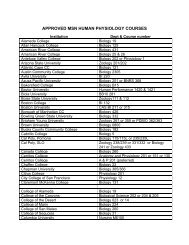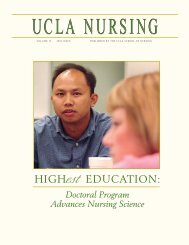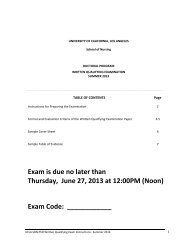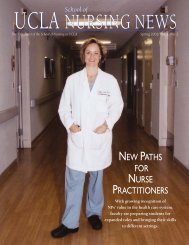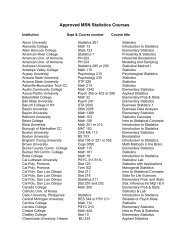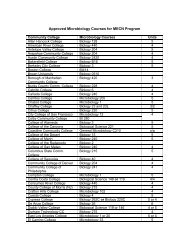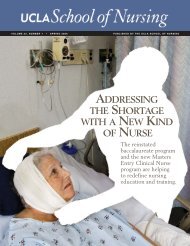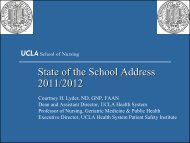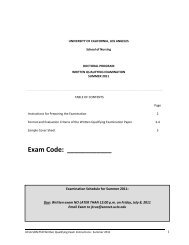student handbook 2013-2014 - UCLA School of Nursing
student handbook 2013-2014 - UCLA School of Nursing
student handbook 2013-2014 - UCLA School of Nursing
Create successful ePaper yourself
Turn your PDF publications into a flip-book with our unique Google optimized e-Paper software.
MSN-MASTER’S ENTRY CLINICAL NURSE (MSN-MECN) PRE-LICEN-SURE PROGRAMPROGRAM GOALSThe Master <strong>of</strong> Science in <strong>Nursing</strong>-Master’s Entry Clinical Nurse (MSN-MECN) program optionis designed to produce nurse generalists with special leadership skills and cultural competencywho assume accountability for healthcare outcomes for a specific group <strong>of</strong> clients throughthe assimilation and application <strong>of</strong> evidence-based research. These nurses function in theacute hospital-based setting as well as a variety <strong>of</strong> community settings. MSN-MECN nursesapply core concepts <strong>of</strong> ethical and social justice, research, primary, secondary and tertiaryprevention, advanced research and systems theory, and health care policy to their role asprovider and manager <strong>of</strong> care at the point <strong>of</strong> care to individuals and cohorts. After programcompletion, the MSN degree is awarded and the graduate is eligible to take the NationalCouncil Licensing Examination (NCLEX) to be certified as an RN. Graduates are prepared toimplement outcomes-based practice and quality improvement in clinical settings.After completing the MSN-MECN, graduates are able to complete the following objectives:1. Select, evaluate and apply, in an acute hospital and a variety <strong>of</strong> other settings, basicand advanced theoretical knowledge <strong>of</strong> core concepts, including advanced leadershipand health care systems to the nursing process in order to deliver healthcare to clientsfrom ethnically diverse cultural backgrounds2. Analyze health problems at a unit, aggregate (community), and systems level,and develop nursing interventions that balance the health needs at the unit andcohort levels3. Demonstrate effective communication and collaboration skills with clients,research participants, other health pr<strong>of</strong>essionals, colleagues and policy makers4. Evaluate existing nursing and healthcare systems research, apply findings tonursing practice and participate in the development <strong>of</strong> new knowledge5. Demonstrate leadership and system skills and critical thinking that contribute tothe effectiveness and efficiency <strong>of</strong> nursing and health care6. Practice hospital- and community-based nursing, based on the principles <strong>of</strong>ethics and law7. Participate in pr<strong>of</strong>essional and community organizations and/or interest groupsrelevant to healthcare delivery and modify nursing standards and practices inkeeping with current trendsF13-S14 | page 11


